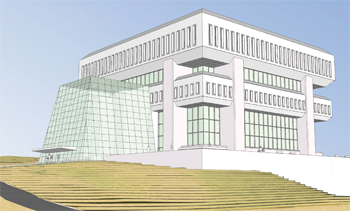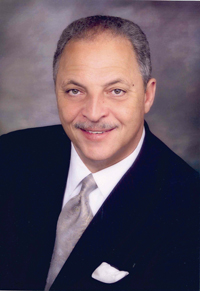
This artist’s rendering shows proposed improvements to the Meharry Medical College Library, housed in the school’s S.S. Kresge Learning Resources Center.
Meharry Library renovation aims to create modern information center

John Maupin Jr., D.D.S.
For years the condition of the Meharry Medical College Library has worn on the college's president, John Maupin Jr., D.D.S.
The renovation of the 22-year-old building that is home to the library is fast becoming one of the most important projects of his presidency.
For 11 years Maupin has been at the helm of the college's renaissance – shepherding the historically black institution through the reversal of financial woes, academic challenges and the renovation of its teaching hospital, Nashville General. Now, his focus turns to the three-level library, housed in the the S.S. Kresge Learning Resources Center.
“When it comes down to it, the library has to be the center of the campus,” Maupin said. “It represents what an academic institution is all about – the acquisition of knowledge.”
Lacking in updated materials, services, resources, technology and aesthetic properties, Maupin wanted to transform the library into a modern information center. He turned to Vanderbilt University Medical Center for assistance. Already partnering on various projects under the Meharry-Vanderbilt Alliance structure, the fit was a natural one.
The two institutions formed the alliance in 1999 to enhance the educational, scientific and clinical programs at and between both institutions, as well as to assist with collaborative efforts in the areas of medical education.
Over the years, Maupin noticed that more students were going to Vanderbilt's Eskind Biomedical Library (EBL) for resources. In 2002, he led a search for a new library director, and though one has not yet been named, the search revealed a “clearer vision of what the library could be,” Maupin said.
“I wanted to better assess the needs. In order to modernize the library a plan of action was necessary. We had to create a shared vision – one developed by students, faculty, consultants and alumni. It was important that the change reflects the school's mission,” he said.
Vanderbilt's EBL, through a five-year collaboration, is assisting Meharry in the renovation and modernization of the library, with the goal of turning it into a state-of-the-art information center. The five-year project will be funded through a $20 million capital campaign.
The project is headed by Nunzia B. Giuse, M.D., M.L.S., professor of Biomedical Informatics and director of the EBL. Other members of the EBL management team working on the project include Deborah Broadwater, Marcia Epelbaum, Frances Lynch, Christopher Ryland and Annette Williams. EBL staff Taneya Koonce, Dan McCollum, Nila Sathe and Rachel Walden also assist on the project as needed.
Giuse reports to Maupin, as this project largely represents his overall view and vision of the future library. Bernard Ray, Ph.D., deputy to the President at Meharry, serves as the Meharry liaison. Tuck Hinton Architects PLC of Nashville is responsible for the design and renovation.
Critical objectives of the collaboration are to modernize the operation of the library, train staff, execute physical renovations and upgrades and assist in recruiting a library director in 2010.
First on the team's agenda was upgrading the scope of, and access to, the library's collection. In April, the team launched a digital library, making more than 2,000 electronic journals, books, databases and Web sites available to the Meharry community. Also, at the beginning of the 2005 academic year, the library extended its operating hours.
“These were two requests from the students,” said Giuse. “The digital component allows students to view the collection from both campus and home, making it convenient. By moving forward with this update we are able to facilitate any form of study and collaboration of the student population as well as the faculty. A library is the center for intellectual exchange and study.”
Giuse said the next step in the modernization project is ensuring that all Meharry library staff members are skilled and well trained.
“We are setting this library up for long-term success,” she said. “Part of my philosophy has always been to give your very best to any project. And I want all the members of the team working with me to live up to that expectation.”
The creation of the Information Center will contribute to achieving Meharry's vision of becoming recognized as a national leader in the field of advancing research in topics affecting minorities and the underserved. Already known for its work on health disparities, Meharry will be able to better disseminate information on health care issues that disproportionately affect minorities such as cancer, AIDS, diabetes and disease and conditions affecting women's health.
“Ultimately, the future of any signature library will not rely on the number of shelves and paper materials, but rather the provision of relevant information and the proper use of technology that aids the institution in offering value-added information and healthcare services,” Giuse said.
Maupin agrees that the library will become the focal point of the campus and shed light on the school's “ascension” to a new level of excellence.
Maupin applauds the partnership with EBL on this project.
“The entire team has been patient, understanding and respectful of Meharry's history, circumstances and challenges,” he said. “They have helped us usher in a new era of library sciences to Meharry. From day one, it was understood that we are modernizing the Meharry library to remain Meharry's library. That respect has really carried this project forward.”













